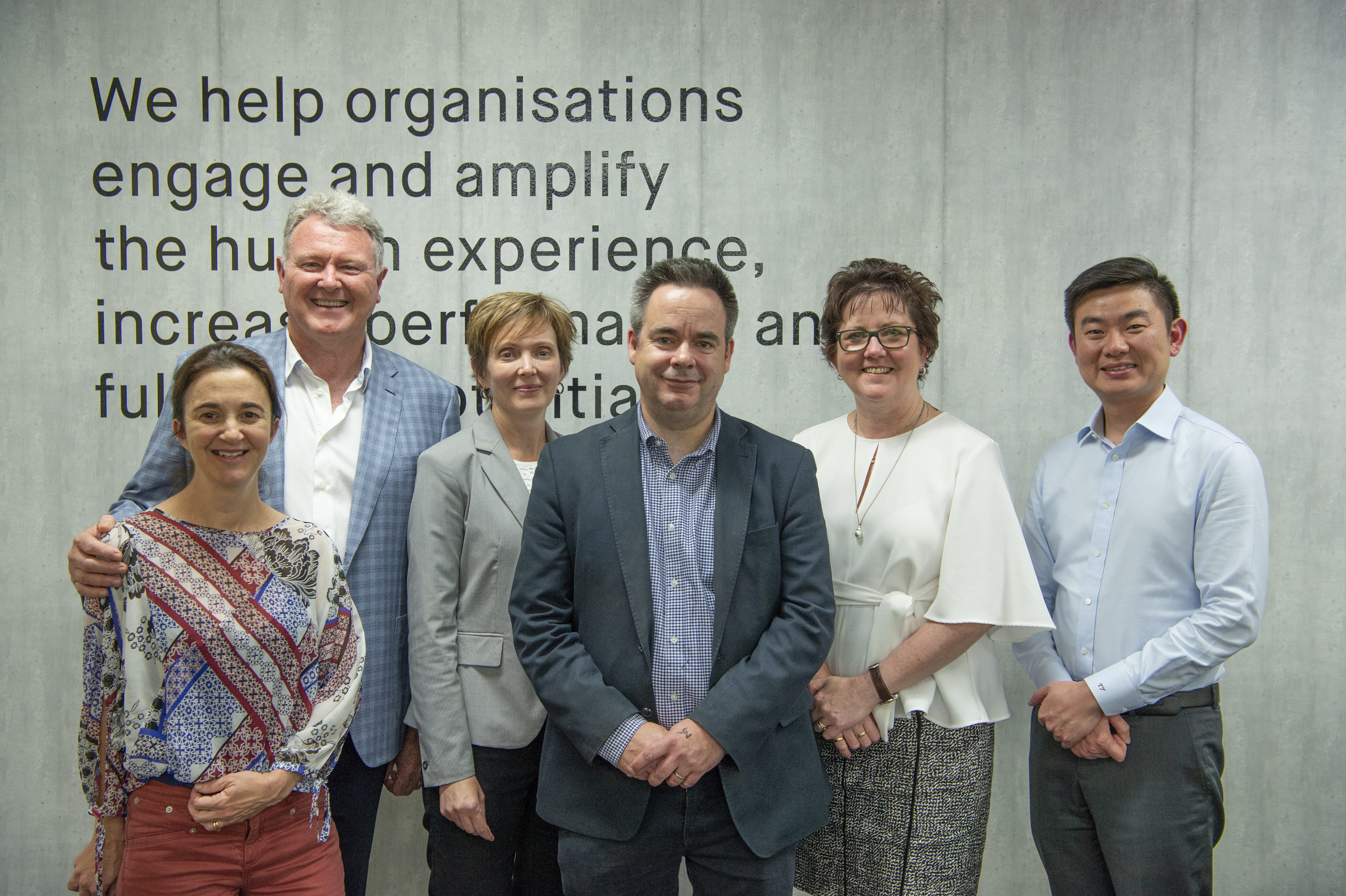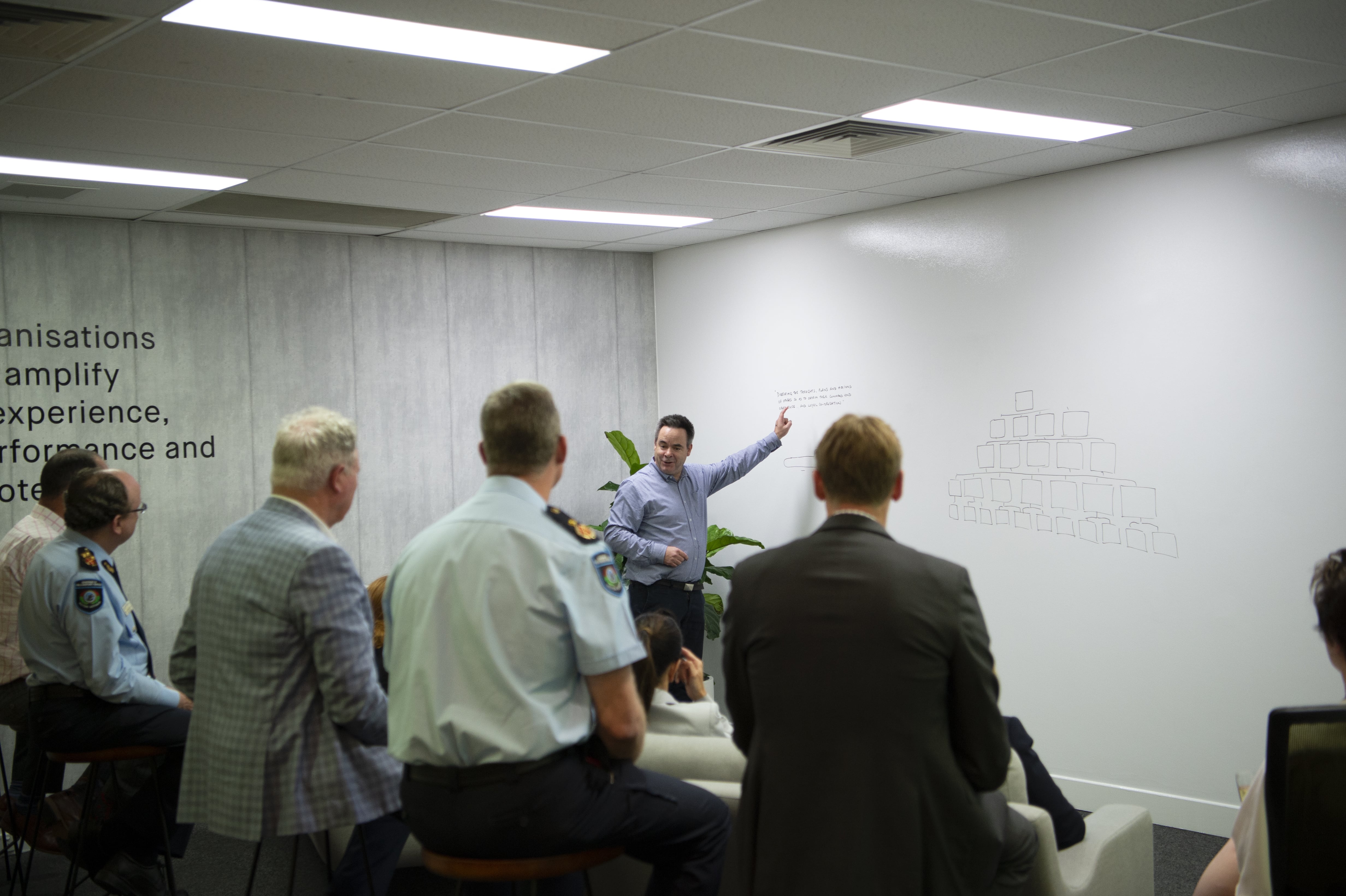Recap of IBL Events
We were excited to host Intent-Based Leadership expert Peter Russian in Perth recently, bringing him out to Australia to host a two-day Bootcamp and VIP masterclass. With all events selling out, we know there will be a few clients and partners who would have liked to attend but missed the opportunity.
Peter shared a number of insights over the presentation days, as well as during his time in our Subiaco design studio with us. If you missed the announcement, Peter is the Global Consulting and Partnership Lead at Intent-Based Leadership Institute – an organisation set up by former Capt. David Marquet.
David Marquet’s best selling book, Turn The Ship Around is well worth a read and is available as an ebook (and audiobook at Audible) here. The methodology comes from his own experience. He was selected to captain the USS Olympia, a nuclear-powered attack submarine. After studying the sub intensely for over a year, unexpectedly, David was diverted to take command of the USS Santa Fe.
The Santa Fe was the worst performing submarine in the fleet and a different type of submarine that he knew little about. David realised that the leader-follower environment meant his crew would do anything he said—even if it was wrong. That could be catastrophic. He decided to try Intent-Based Leadership.
David Marquet began treating his crew as leaders, not followers, and giving control, not taking control. Santa Fe went from “worst to first”, achieving the highest retention and operational standings in the Navy.
Just to recap, what is Intent-Based Leadership?
It’s a way to revolutionise the way your people work. At the Masterclass, Peter showed us a familiar sight: the traditional org-chart with its top-down hierarchy. What Intent-Based Leadership does is empower those on the front lines to act and solve problems. Rather than coming to a line manager with an issue, or waiting for a command, they communicate their intent, get permission for that intent (when needed) and follow through.
The three C’s… and an S.
In order to lead an organisation through the Intent-Based method, we first need to establish some foundations, which Peter explained as the Three Cs.
The first is “Competence”.
It may sound obvious, but competence is very often taken for granted. Managers need to reflect on their own skill sets, where they excel and have limitations – as well as understand their team’s skills. Giving someone full control to make decisions where they are not competent to do so, is folly. A simple test of whether someone has the appropriate level of competence is to ask them: “Is it a safe thing to do?” Their response (verbal and non-verbal) will tell you.
The next is “Clarity”. Your team can’t act if they don’t clearly understand the objectives. An effective manager will be transparent and specific about both long and short-term goals. As a leader, the question you want appropriately answered is: “Is it the right thing to do?”
“Competence” and “Clarity” are the pillars for the third C: “Control.” If your team has the competence and are clear about the objective, there’s little reason to withhold control over their actions at work. The opposite of this is micro-management (and who has time for that?!).
Importantly: Safety Comes First.
A culture of psychological safety is crucial to the successful implementation of IBL. In a cut-throat, intra-competitive business, issues may arise. For example, how confident are you or your team to say: “I don’t know”? How does your management deal with failures on all levels: through punishment or gaining wisdom?
Unless there’s a culture where people at all levels are welcomed and encouraged to voice concerns or share insights without retribution, implementing IBL could cause headaches for the organisation.
Amy Edmonson, a professor of Harvard Business School, first identified the concept of psychological safety in work teams in 1999. It describes an interpersonal climate where candour is expected and enabled. In a team environment, it’s a shared belief that the team is safe for interpersonal risk-taking. Team members are free to be themselves without fear of repercussion.
And it’s key to high performance. In 2012, Google embarked on an initiative which they code-named Aristotle. The initiative studied hundreds of teams to figure out why some teams at Google were effective and others not so much. Their data indicated that psychological safety, more than anything else, was critical to making a team work.
Asking how or what, rather than asking why; thanking people for telling you about their mistakes or problems; admitting at times that you don’t know, and asking open questions are all ways to create an environment of psychological safety.
Using tools like Poll Everywhere or even post-it notes where people can state their views and opinions anonymously, can be useful – particularly on important and sensitive issues.
Is Intent-Based Leadership applicable in all cultures?
An attendee raised a good point during the masterclass. As a U.S. formed leadership style, can IBL translate to other countries? In short, the answer is yes, and Peter shared examples to prove this. Effective leadership transcends geography and will spur international teams to become more closely aligned.
Here’s a link to Keogh’s Extend leadership development program.
How does an organisation apply Intent-based leadership in a sustainable way?
We were particularly keen to get Peter’s insights on how to introduce IBL into an organisation in a way that creates sustainable behavioural change.
It was no surprise to us that delivering a series of Bootcamps and Masterclasses is not going to cut it. Rather, an organisational intervention would normally involve an initial observation phase to tailor the intervention appropriately. Phase II would usually be a series of short, sharp workshops at varying levels of leadership, each interspersed with on-the-job practical application of learnings.
Next, a period of “live” observation and mentoring in the organisation to guide and embed the application of intent-based leadership across a team. Leaders are often supported by internal champions and some organisations choose to have internal IBL facilitators to sustain the momentum.
We firmly believe that Intent-Based Leadership is a powerful tool for getting the best out of an entire organisation, as well as being part of a remedy to toxic work environments. If your intent is to apply best practices and create long-lasting change in your organisation, let Keogh help you lead the way.











